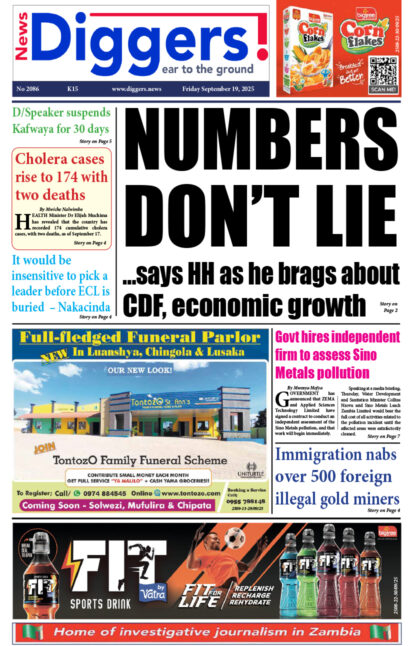Nearly 100 media groups are part of a consortium that is investigating how the world’s powerful and ultra-wealthy, secretly invest vast amounts of cash in offshore tax havens.
Zambia’s opposition leader Hakainde Hichilema has been named in the latest exposé dubbed “The Paradise Papers”, but with a huge disclaimer about some of the people named in the offshore leaks.
There are legitimate uses for offshore companies and trusts. We do not intend to suggest or imply that any people, companies or other entities included in the ICIJ Offshore Leaks Database have broken the law or otherwise acted improperly. Many people and entities have the same or similar names. We suggest you confirm the identities of any individuals or entities located in the database based on addresses or other identifiable information.
THE OFFSHORE LEAKS
A huge new leak of financial documents has revealed how the powerful and ultra-wealthy, secretly invest vast amounts of cash in offshore tax havens.
Donald Trump’s commerce secretary is shown to have a stake in a firm dealing with Russians sanctioned by the US.
The leak, dubbed the Paradise Papers, contains 13.4m documents, mostly from one leading firm in offshore finance.
BBC Panorama is part of nearly 100 media groups investigating the papers.
As with last year’s Panama Papers leak, the documents were obtained by the German newspaper Süddeutsche Zeitung, which called in the International Consortium of Investigative Journalists (ICIJ) to oversee the investigation. The Guardian is among the nearly 100 media partners involved in investigating the documents.
Sunday’s revelations form only a small part of a week of disclosures that will expose the tax and financial affairs of some of the hundreds of people and companies named in the data, some with strong UK connections.
Many of the stories focus on how politicians, multinationals, celebrities and high-net-worth individuals use complex structures of trusts, foundations and shell companies to protect their cash from tax officials or hide their dealings behind a veil of secrecy.
The Paradise Papers reveal offshore interests and activities of more than 120 politicians and world leaders, including Queen Elizabeth II whose private estate indirectly invested in a rent-to-own loan company accused of predatory tactics. At least 13 allies, major donors and Cabinet members of U.S. President Donald J. Trump appear, including Commerce Secretary Wilbur Ross’s interests in a shipping company that makes millions from an energy firm whose owners include Russian President Vladimir Putin’s son-in-law and a sanctioned Russian tycoon.
The leaked files from Appleby, the offshore law firm, include details of tax planning by nearly 100 multinational corporations, including Apple, Nike and Uber.
WHAT DID ICIJ SAY ABOUT ZAMBIA’S HICHILEMA?
Hichilema became a director of a Bermuda company, AfNat Resources Ltd., in March 2006, and he resigned that August, according to Appleby’s records. AfNat Resources was incorporated in 2005 and explored for nickel and other metals in Zambia and other African countries. It was listed on London’s alternative investment market until 2010 when it was purchased by Canadian mining company Axmin for about $14 million.
Hichilema declined to answer questions from ICIJ, including about his roles as director. There is nothing illegal about a company registered in Bermuda, Hichilema told ICIJ by phone.
HOW DO TYCOONS HIDE MONEY OFFSHORE?
Anyone who wants to set up an offshore enterprise, for any reason, must navigate the laws and regulations of the territory in question. And for that, they will need lawyers.
Enter Appleby is one of a handful of major international “offshore legal service providers”.
Its business is to help clients, be they financial institutions, global corporations or high-net-worth individuals, to set up and register companies and trusts in overseas jurisdictions with low or zero tax rates and high financial confidentiality.
It’s the kind of work which, inevitably, can lead to contact with those who have chequered backgrounds, controversial reputations or opaque motives. That’s not to say the aims of such clients are not above board.
Appleby, like all legal firms in this field, uses a term for such clients and potential clients – politically exposed persons, or PEPs. A PEP is someone with a prominent profile – a celebrity of the political, diplomatic, military or judicial worlds – who, through their prominent position or influence, is more susceptible to being involved in bribery or corruption. By extension, any close family member of a PEP, is also a PEP.
LOOK OUT FOR ICIJ LEAKS
ICIJ and its media partners will be publishing multiple stories in the coming days and weeks, including:
On Monday afternoon, stories on strategies used by multinational corporations to shift profits to low-tax jurisdictions; and a look into the world of private jets and yachts registered by wealthy owners in offshore tax havens;
On Tuesday afternoon, stories that look behind the huge offshore trust funds held by rich and powerful people; how prominent political donors in the U.S. make use of offshore financial structures; and reporting on tax haven shopping sprees by multinational companies in Africa and Asia that use shell companies in Mauritius;
And more to come on Wednesday, Thursday, Friday and into the next week.
ICIJ will also release the structured data connected to the Paradise Papers investigation in the coming weeks on its Offshore Leaks Database.
For more on the Paradise Papers, click here
























